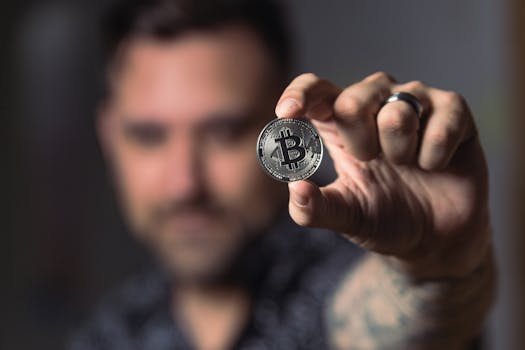Top 5 Crypto Coins Popular Among South Africans
The rise of cryptocurrency has taken the world by storm, and South Africa is no exception. With a growing number of investors and traders, the local interest in digital currencies has surged. In this blog post, we will explore the top 5 crypto coins popular among South Africans, examining their features, market performance, and why they have captured the attention of local investors.
1. Bitcoin (BTC)
As the pioneer of cryptocurrencies, Bitcoin remains the most recognized and widely used digital asset globally. Launched in 2009 by an anonymous entity known as Satoshi Nakamoto, Bitcoin operates on a decentralized network using blockchain technology.
In South Africa, Bitcoin has gained immense popularity due to its status as a digital gold. According to a report by CryptoCompare, the demand for Bitcoin in South Africa has increased steadily, with many investors viewing it as a hedge against inflation and currency devaluation.
- Market Capitalization: As of October 2023, Bitcoin’s market cap is over $800 billion.
- Adoption: Numerous South African merchants now accept Bitcoin as a payment option, including major retail chains.
- Accessibility: Local exchanges like Luno and VALR allow easy access to buying and selling Bitcoin.
2. Ethereum (ETH)
Ethereum has established itself as a leader in the world of smart contracts and decentralized applications (dApps). Created by Vitalik Buterin in 2015, Ethereum allows developers to build and deploy applications on its blockchain, making it much more than just a cryptocurrency.
South African tech enthusiasts and developers are particularly drawn to Ethereum for its extensive capabilities. The growth of the decentralized finance (DeFi) sector has further fueled interest in ETH, as many DeFi projects are built on the Ethereum network. According to CoinDesk, Ethereum has become a vital part of the financial ecosystem in South Africa, enabling innovative solutions for banking and finance.
- Market Capitalization: Ethereum’s market cap is approximately $200 billion.
- Use Cases: From NFT marketplaces to DeFi platforms, Ethereum’s versatility is unmatched.
- Local Projects: South African developers are increasingly launching projects on the Ethereum blockchain, contributing to a vibrant local ecosystem.
3. Cardano (ADA)
Cardano, founded by Charles Hoskinson, is recognized for its commitment to sustainability and scalability. Unlike Bitcoin and Ethereum, Cardano takes a research-driven approach to development, focusing on rigorous academic peer reviews.
In South Africa, Cardano has gained traction due to its environmentally friendly Proof of Stake consensus mechanism, which consumes less energy compared to traditional mining methods. According to the Cardano Foundation, the platform aims to provide a more secure and scalable blockchain ecosystem, which resonates well with South African investors who are conscious of sustainability.
- Market Capitalization: Cardano’s market cap is around $13 billion.
- Community Engagement: South African Cardano communities are active, organizing meetups and educational sessions.
- Partnerships: Cardano has formed partnerships to promote blockchain solutions in various sectors, including education and finance.
4. Solana (SOL)
Solana is often touted as a challenger to Ethereum due to its high throughput and low transaction costs. Launched in 2020, Solana has quickly become a favorite among developers and investors alike for its fast and scalable blockchain technology.
In South Africa, the Solana ecosystem has started to gain attention, particularly among DeFi and NFT projects. The platform can process thousands of transactions per second, making it an attractive option for local developers looking to launch applications without the high fees associated with Ethereum. According to The Block, Solana’s growth has been remarkable, with many projects migrating from Ethereum to take advantage of its efficiency.
- Market Capitalization: Solana’s market cap is around $10 billion.
- Transaction Speed: Solana boasts transaction speeds of up to 65,000 transactions per second.
- Growing Ecosystem: South African developers are increasingly building on Solana, contributing to its rapid growth.
5. Ripple (XRP)
Ripple is unique in its focus on facilitating cross-border payments. Unlike many cryptocurrencies that aim to replace traditional currency, Ripple’s primary goal is to enhance the existing financial infrastructure by providing a faster and cheaper way to transfer money globally.
In South Africa, Ripple has garnered interest among banks and financial institutions looking to streamline their international payment processes. According to a report by the Ripple Labs, banks in South Africa are exploring partnerships to utilize the RippleNet network, which could significantly reduce transaction costs and processing times.
- Market Capitalization: Ripple’s market cap is approximately $20 billion.
- Partnerships: Ripple has established relationships with several banks and payment providers in South Africa.
- Real-World Use Cases: Ripple’s technology is being tested for remittances, which is particularly relevant in a country with a high number of migrant workers.
Understanding the South African Crypto Landscape
The landscape of cryptocurrency in South Africa is evolving rapidly, with increasing regulatory clarity from the Financial Sector Conduct Authority (FSCA). As more South Africans become aware of the benefits and opportunities presented by cryptocurrencies, the market is expected to grow significantly. Investors are advised to conduct thorough research and consider factors such as market cap, technology, and real-world applications when choosing their preferred digital assets.
Moreover, educational initiatives are crucial in promoting responsible investing and usage of cryptocurrencies. Local organizations and universities are beginning to offer courses and resources on blockchain technology, further empowering potential investors.
Frequently Asked Questions
- What is the safest way to buy cryptocurrencies in South Africa?
Using reputable exchanges such as Luno or VALR is recommended. Always enable two-factor authentication and use secure wallets for storage.
- Are cryptocurrencies legal in South Africa?
Yes, cryptocurrencies are legal in South Africa, but they are not considered legal tender. They are regulated by the FSCA.
- How can I keep my crypto investments secure?
Utilize hardware wallets for long-term storage, enable security features on exchanges, and stay informed about potential scams.
As the digital currency market continues to develop, keeping informed about these top 5 crypto coins popular among South Africans can help investors make educated decisions and navigate this exciting financial frontier.

